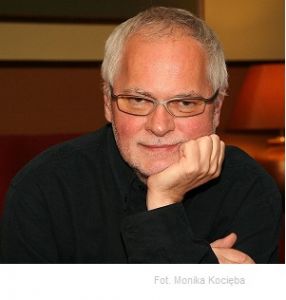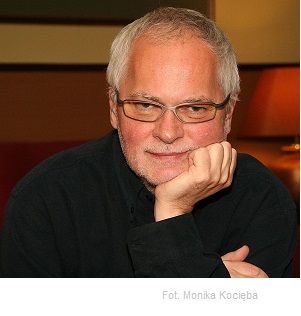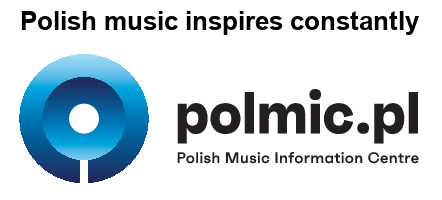Szeremeta Ryszard
-
composer, performer
composer, jazz singer, music publisher and impresario; b. May 5, 1952, Kraków. He studied at the State Higher School of Music in Krakow: in 1971-76 – composition with Lucjan Kaszycki, in 1972-75 – conducting with Jerzy Katlewicz, in 1974-76 he was the first student and graduate of Józef Patkowski, the founder and long-time head of the Polish Radio Experimental Studio (created in 1959, the fourth in Europe center of electronic music). Other prominent lecturers of Szeremeta include: Zbigniew Bujarski, Mieczysław Drobner, Elżbieta Dziębowska, Aleksander Frączkiewicz, Zbigniew Jeżewski, Tadeusz Machl, Krzysztof Meyer, Krystyna Moszumańska-Nazar, Józef Rychlik, Bogusław Schaeffer, Marek Stachowski, Jacek Targosz, and Mieczysław Tomaszewski.
The breakthrough impact on his music education and career was made by three events. The first of them was cooperation with prof. Kaszycki, thanks to which Szeremeta was able to record his first graphic score for Telewizja Polska (Tygodniówka, 1971). The work was performed by the famous Cracow jazz-rock group, Janusz Grzywacz’s "Laboratorium", conducted by the composer. For a 19-year-old first-year student of a music academy, it was quite an achievement, but above all, it determined the recognition of Szeremeta on the European music market. Further milestones in the composer's professional life was assisting professor Katlewicz at the Kraków Philharmonic in work on the premieres of works by Krzysztof Penderecki, and a gift from prof. Patkowski in the form of a portable audio synthesizer - the iconic Mini Synthi. This portable, elementary laboratory for the synthesis of pitch and timbre ultimately determined the career of Szeremeta.
In 1977, just after graduation, the composer was awarded the Grand Prix of the Tadeusz Baird Young Composers' Competition for the song Wszytki Płacze. The prize in the competition was an annual composer scholarship in the USA, where, however, Szeremeta could not go due to the imposing of martial law in Poland in December 1981.
At the same time, he began cooperation with the "Novi Singers" vocal quartet, with whom, from 1976 until the dissolution of the band in 1985, he recorded and performed in Poland and abroad together with Ewa Wanat, Waldemar Parzyński and Janusz Mych, during the Jazz Jamboree Festival in Warsaw and the International Jazz Festival in Montreux, Switzerland. Working with "Novi Singers" has resulted in the preparation of many vocal transcriptions and studies of Polish folk music, Christmas carols and Fryderyk Chopin's mazurkas. In 2001, the revived band performed at the "Warsaw Autumn" Festival. Ryszard Szeremeta is considered the precursor of scat singing in Poland.
However, the singing episode was just a kind of musical adventure, because the most important field in Szeremeta's output was experimental music. The composer made his debut at the Warsaw Autumn International Festival of Contemporary Music in 1981 with the symphonic piece Advocatus diaboli under the baton of Andrzej Markowski. He developed his skills and knowledge during his numerous practices and scholarships at the biggest electronic music centers in the world. In 1982 he completed post-graduate composition studies at the Guildhall School of Music and Drama in London under the direction of Alfred Nieman and Robert Saxton. In 1986 he went on a computer training at Elektronmusikstudion in Stockholm, where he worked under the direction of Lars Gunnar Bodin and Tamas Ungvary, and in 1991 he was a composer-in-residence at the International Institute of Electroacoustic Music (Institut international de musique électroacoustique) in Bourges, France under the direction of Françoise Barrière.
An important step in Ryszard Szeremeta's career was collaboration with Andrzej Trzaskowski, for whom in the years 1979-1986, he composed many pieces later performed by the Polish Radio's Jazz Orchestra Studio S-1. In the years 1985-1999, he gave concerts with the "Crossover" trio, which he founded together with Jan Pilch, David Pituch and Jarosław Kapuściński.
In the 1990s, he was a member of the Repertoire Committee of the Warsaw Autumn Festival and the vice-president of the Polish Composers' Union, and also composed for Besta Film, ARD, ZDF, SDF, Arte and 3Sat. During this period, he repeatedly presented his compositions during music events around the world, including the Lincoln Center in New York and the University of Pennsylvania in Philadelphia. Since 1989, he has been the publisher of the Swiss multimedia publishing company Arcadia Music Services International, which has published his ten monographic albums.
In the years 1999-2010, at the invitation of Wojciech Kępczyński (reformer of the Roma Musical Theater), he pursued impresario activity. For the Roma Theater, he obtained from England, France and USA licenses for musicals: Miss Saigon, Grease, Cats, Roman Polański Dance of the Vampires, Phantom of the Opera and Les Misérables.
Szeremeta belongs to a small group of precursors of electronic, experimental and electroacoustic music in Poland, which was reflected in his (by recommendation of Prof. Józef Patkowski) management of the Experimental Studio of the Polish Radio in Warsaw in 1985-1999. During the entire period of his work, he also composed many pieces of film and pop music. Since 1986 he has been a member of the International Society for Electroacoustic Music in Bourges.
The composer, for almost his entire professional life associated with the Warsaw Autumn International Festival of Contemporary Music, presented there nine premieres of his works, including the Triple Concerto for 3-tape exposition from 1995, awarded in the European Union of Television Broadcasters competition and included by the jury of International Society for Contemporary Music to the program of the World Days of Music 1997.
Szeremeta has received many awards for his compositions at home and abroad. The most important prizes to be mentioned are: the already mentioned Grand Prix of the Tadeusz Baird Young Composers' Competition. (1977), award in the Polish Radio Competition (1979), award in the Competition of Electroacoustic Music in Bourges (1981), award in the Competition of Electronic Music in Varèse (1984), Henryk Wars Award for lifetime achievement by the ZAiKS Association of Authors (1987), award in the Competition of the International Electroacoustic Tribune in Oslo (1989) and the award of the European Broadcasting Union Tribune in Budapest (1995).
updated: 2017 (Aleksandra Braumańska)
Compositions
Wszytki Płacze for choir and percussion to the words by Jan Kochanowski (1975)
Suita Kreacje for vocal quartet and instrumental ensemble (1978)
Capricorn for harpsichord (1979)
Excitation for tenor, vocal quartet, piano, percussion and bass (1979)
On a slow fire for vocal quartet and instrumental ensemble (1979)
Merry go round for vocal quartet and instrumental ensemble (1979)
The Sleeping Beauty for vocal ensemble (1979)
Advocatus diaboli for large symphony orchestra (1980-1981)
Points I for electroacoustic layer and interactive improvisation (1981)
Points II for electroacoustic layer and interactive improvisation (1981)
Święty eksperyment for 12 voices, 2 prepared pianos, xylophone and magnetic tape (1983)
Pulse rate for electroacoustic layer and interactive improvisation (1984)
Amphora for electroacoustic layer and interactive improvisation (1984)
Agent Orange for electroacoustic layer and interactive improvisation (1986)
Miraculeo for electroacoustic layer and interactive improvisation (1988)
Chamber Music for voices, electroacoustic layer and interactive improvisation (1988)
Don Roberto and Dona Mercedes (Gravity, Gloomy River, C-C-D Blues, Musician, Tightrope Dancer, Stuck to Joe, Dona Mercedes, Don Roberto) for saxophone, trumpet, percussion and electronic layer (1988)
Constellation (Libra, Aquarius, Scorpius, Hydra, Cancer, Pictor, Crater, Columba) for vocal sextet and instrumental ensemble (1988)
Trickstar for electroacoustic layer and interactive improvisation (1989)
Mirror I – Liryki Jamesa Joyce’a for electroacoustic layer and interactive improvisation (1989)
Mirror II – Liryki Jamesa Joyce’a for electroacoustic layer and interactive improvisation (1989)
Entering 1990 for electroacoustic layer and interactive improvisation (1990)
Patchwork for large symphony orchestra (1990)
Double Saxophone Concerto (1990)
Vision and Utopia for electroacoustic layer and interactive improvisation (1990)
M’ bout M for electroacoustic layer and interactive improvisation (1993)
SY 99 Message for electroacoustic layer and interactive improvisation (1993)
Stringplay for electroacoustic layer and interactive improvisation (1994)
Triple Concerto na warstwę elektroakustyczną i improwizację interaktywną (1995)
Extraterrestrials (Faraway Galaxies, Set-off into, Contacts of the Third Kind, Visitors from the Outer Space, Signs of the Past, Weightlessness) for electroacoustic layer and interactive improvisation ( (1995)
Hourglass for tape and violin or all others designated for interactive improvisation (1996)
Triple Concerto for electroacoustic layer and interactive improvisation (1997)
Metrograph Future for electroacoustic layer and interactive improvisation (1997)
Un morceau de Mac for electroacoustic layer and interactive improvisation (1997)
Future Music for electroacoustic layer and interactive improvisation (1998)
Metrograph Words for electroacoustic layer and interactive improvisation (1998)
Metrograph Touch for electroacoustic layer and interactive improvisation (1998)
Belief for electroacoustic layer and interactive improvisation (1999)
Celtic Circles (Druide, The Magic Mistletoe, The Holy Grove, The Golden Sickle, Rune-Stones, Dance of Life) for electroacoustic layer and interactive improvisation (2001)
Metrograph 45 SE for electroacoustic layer and interactive improvisation (2002)
Legendary Creatures (Life-giving Protoplasma, From single cells to the Crown of the Creation, Primitive Life-forms, Inhumane Living Beings, Creatures from the Realms of Fables) for electroacoustic layer and interactive improvisation (2004)
Voodoo-cults (Mental Preparation, Trance-Prophecies, Elemental Spirits, Mediumize, Macumba, Frenzy) for electroacoustic layer and interactive improvisation (2006)
Druids’ Knowledge (Priests of Albion, Voice of Deity, Bards of God, Sacred Grove, Servants of Divinity, Lost Knowledge) for electroacoustic layer and interactive improvisation (2008)
Ballet of the Electrons (Setting up of the Neutrons, Step by step, Fundamental Nuclear Particles, Tap-dance-accelerator, Particle configuration, Quantum Jumps) for electroacoustic layer and interactive improvisation (2010)
Microcosmos Macrocosmos (Tabula Smaragdina, Mind and Matter, Tectonics of a Monad, Structural stones of the Universe, Devision Ratio, Down to the Last Detail) for electroacoustic layer and interactive improvisation (2012)
The Art of Genetics (Enlarged Cognition, Natural patterns, Schematic structures, Hereditary dispositions, Inseminate artificially Genetic Code) for electroacoustic layer and interactive improvisation (2014)
Soul Solution (Attempt to Liberate, Intermediate State, Inner Space, Goin Inward, Borderlines, Deliverence) for electroacoustic layer and interactive improvisation (2016)
Compositions written for the Andrzej Trzaskowski Studio S-1 jazz band in the years 1979-1986:
Dingo Dog
Bezwietrzny sobotni dzień
Rajski ptak i ja
Pełną parą
Zambo
The ancient guildhall
The Barbican
Folk Disco Cybernetic
Koncert na klarnet i big band
Nowy rok minął
From Hendon to Clapham
Zygmunt Stary
Sax, sax
Spring garden
Ready
Steady
Go
Swiss cottage
Break smash
Just a moment
Malina
Milczek
Mr Anderson
The Frog
Samba Blond
Songs:
Czekam na cud (E. Żylińska)
Człowiek, człowiek (J. Wołek)
Dom w Alei Róż (A. Mogielnicki)
Duet liryczny (R. M. Groński)
Firma Ja i Ty (A. Mogielnicki)
Już nie ma dzikich plaż (K. Logan-Tomaszewski)
W tonacji A-dur (W. Młynarski)
Wielki szary nikt (E. Żylińska)
Wolniej (J. Wołek)
Wsiadaj na miotłę (W. Młynarski)
Music to films:
Bitwa Racławicka, directed by M. Sieński (1985)
Krok od przepaści, directed by M. Sieński (1985)
Czarny błysk, directed by W. Giersz, K. Giersz, J. Gałązkowski (1986)
Po obu stronach muru, directed by M. Sieński (1987)
Wymarsz, directed by W. Ronisz (1988)
Gra złudzeń, directed by M. Sieński (1988)
Witkacego wywoływanie duchów, directed by K. Urbański (1989)
Lunapark, directed by K. Urbański (1989)
Kadisz. Ostatni Żydzi z Szargorodu, directed by S. Krzemiński, M. Siemieński (1992)
Bilet do wieczności, directed by E. Borzęcka (1992)
Pośmiertny triumf Władysława Strzemińskiego, directed by H. Kramarczuk (1993)
Dzieci Tundry, directed by J. Śladkowski (1994)
Calineczka, directed by A. Hofman (1994)
Dzika Syberia, directed by J. Śladkowski (1994)
Podróż do Soczi, directed by J. Śladkowski (1994)
Upiory ze złotego Kręgu, directed by J. Śladkowski (1994)
Granica. Galicyjskie losy, directed by M. Bucka, J. Vietig (1994)
Tajmyrski pamiętnik, directed by J. Śladkowski (1994)
Czarnobyl. Klątwa piołunu, directed by S. Krzemiński (1994)
Zemsta wróżki, directed by Z. Wardejn (1995)
Pokój z widokiem na śmierć, directed by G. Siedlecki (1995)
Auschwitz 50 lat później, directed by M. Bucka (1995)
Sprawiedliwi, directed by M. Wiśnicka (1996)
My tutejsi. Białoruskie granice, directed by M. Bucka (1996)
Przeszłość dla przyszłości. Rodzina Czartoryskich, directed by M. Bucka (1996)
To wszawe nagie życie, directed by H. Blumenberg (1997)
Wódka, directed by M. Bucka (1999)
Szpital Dzieciątka Jezus, directed by N. Dragović, G. Siedlecki (1999)
Ural – granica między Europą a Azją, directed by H. Kramarczuk (2000)
Centrum Nadziei, directed by S. Kuźnik, M. Mierzejewska, G. Siedlecki, D. Szymańska-Szymura (2000)
Okrutny talent. Fiodor Dostojewski, directed by M. Bucka, O. Grunnert (2000)
Byli żołnierzami „Jodły”, directed by W. Ronisz (2000)
Rosyjskie bogi, directed by M. Bucka (2000)
Adam i Ewa, directed by A. Hałasińska, P. Chmielewski, J. Skoczeń, J. Gauer, W. Hoflik, H. Rizvi, J. Sarnacki, A. Srebrzyński, F. Zylber (2000-2001)
Złoto carów, directed by M. Bork, M. Bucka (2001)
Klątwa skarbu Inków, directed by K. Lang (2001)
Obcy na Mazurach (2002)
Lew Tołstoj, directed by M. Bucka, O. Gunnert (2002)
Lew Tołstoj większy od innych, directed by M. Bucka, O. Gunnert (2002)
Towarzyszka żona, directed by M. Bucka (2003)
Adopcje, directed by D. Jarzyna, M. Gajczak (2003-2004)
Warto kochać, directed by N. Dragović, J. Sarnacki, J. Kidawa-Błoński, G. Braun, K. A. Burger, P. Chmielewski, M. Męczkowski, W. Beszłej (2005-2006)
Żołnierze wyklęci, directed by W. Ronisz (2006)











